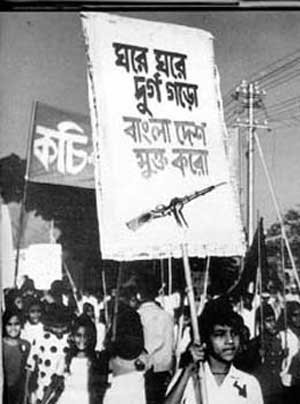1969 uprising (ঊনসত্তরের গণঅভ্যুত্থান) was a democratic political movement in East Pakistan (now Bangladesh ) that came about in 1969.The uprising consisted of a series of mass demonstrations and noncontinuous conflicts between government defense force and therefore the demonstrators. Though the unrest began in 1966 with the six purpose movement of Awami League, it got momentum at the start of 1969 and culminated within the resignation of Marshall Ayub Khan, the primary military ruler of Pakistan. The uprising additionally led to the withdrawal of Agartala Conspiracy Case and final decision of Sheikh Mujibur Rahman and his colleagues from the case.
 The revolutionary rising of the working masses shook the military regime of Ayub Khan, who was replaced by General Yahiya Khan in March 1969. The situation was ripe for a socialist revolution led by the workers. The workers, peasants, urban poor, students, layers of the urban and rural middle categories, and youth showed their determination, courage and power and continued their struggle to overthrow capitalism and feudalism. The concepts of socialism spread like wildfire. The big general strike and mass demonstrations paralyzed the state equipment for over a month, in the East and West. Through this movement the Bengali nations 1st articulated their intentions of identity as an individual nation that was essentially mirrored within the 1st Constitution of Bangladesh by reflective philosophical system, socialism and marked by Bengali nationalism. This can be important to mention, this constitutional statement had been modified through the military rule when 1975 which was closely associated with the coup makers and their intentions. Political instability and economic difficulties marked Pakistan’s history from its formation. In1956, a constitution was finally adopted, describing the country as an ‘Islamic republic within the Commonwealth’. The political musical chairs continued till the imposition of martial law in1958 by General Ayub Khan. This was maintained till 1962, once Khan declared himself president (and field marshal) – he stood down in March 1969. Martial law was once more imposed between 1969, once General Yahiya Khan took over, and 1971. Prolonged military rule any alienated the Bengali population. Not only did the gulf between wealthy and poor reach unprecedented levels, aggravating classtensions, however the inequality between West and East Pakistan also reached new heights.
The revolutionary rising of the working masses shook the military regime of Ayub Khan, who was replaced by General Yahiya Khan in March 1969. The situation was ripe for a socialist revolution led by the workers. The workers, peasants, urban poor, students, layers of the urban and rural middle categories, and youth showed their determination, courage and power and continued their struggle to overthrow capitalism and feudalism. The concepts of socialism spread like wildfire. The big general strike and mass demonstrations paralyzed the state equipment for over a month, in the East and West. Through this movement the Bengali nations 1st articulated their intentions of identity as an individual nation that was essentially mirrored within the 1st Constitution of Bangladesh by reflective philosophical system, socialism and marked by Bengali nationalism. This can be important to mention, this constitutional statement had been modified through the military rule when 1975 which was closely associated with the coup makers and their intentions. Political instability and economic difficulties marked Pakistan’s history from its formation. In1956, a constitution was finally adopted, describing the country as an ‘Islamic republic within the Commonwealth’. The political musical chairs continued till the imposition of martial law in1958 by General Ayub Khan. This was maintained till 1962, once Khan declared himself president (and field marshal) – he stood down in March 1969. Martial law was once more imposed between 1969, once General Yahiya Khan took over, and 1971. Prolonged military rule any alienated the Bengali population. Not only did the gulf between wealthy and poor reach unprecedented levels, aggravating classtensions, however the inequality between West and East Pakistan also reached new heights.
Source: Wikipedia, Academi.edu

Leave a Reply